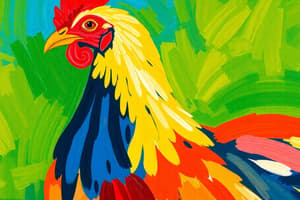Podcast
Questions and Answers
Mother birds always abandon their chicks when the eggs fail to hatch as expected.
Mother birds always abandon their chicks when the eggs fail to hatch as expected.
False (B)
Rufous Hummingbird females educate their young on shelter sites and nesting habits.
Rufous Hummingbird females educate their young on shelter sites and nesting habits.
False (B)
Mother birds play a minimal role in ensuring the growth and development of their offspring.
Mother birds play a minimal role in ensuring the growth and development of their offspring.
False (B)
Some bird species wait up to four days before providing any food to their chicks after hatching.
Some bird species wait up to four days before providing any food to their chicks after hatching.
Father birds are solely responsible for protecting the chicks from predators.
Father birds are solely responsible for protecting the chicks from predators.
Mother birds are not involved in parental care and leave their offspring to fend for themselves.
Mother birds are not involved in parental care and leave their offspring to fend for themselves.
The incubation period for all bird species is the same, typically lasting around two weeks.
The incubation period for all bird species is the same, typically lasting around two weeks.
All mother birds choose to lay their eggs directly onto rocks instead of building nests.
All mother birds choose to lay their eggs directly onto rocks instead of building nests.
Mother birds feed their chicks by hunting for worms, insects, or other prey items suitable for their young ones.
Mother birds feed their chicks by hunting for worms, insects, or other prey items suitable for their young ones.
Kiwis are one of the only bird species that feed their chicks inside the eggshell itself.
Kiwis are one of the only bird species that feed their chicks inside the eggshell itself.
Study Notes
Mother Birds: An Overview of Parental Care
Parental care is a crucial aspect of avian reproduction, with mother birds playing a significant role in raising their offspring. This process involves various activities such as incubating eggs, feeding chicks, protecting them from predators, and teaching them essential survival skills. In this section, we will delve into the details of these parental care behaviors exhibited by mother birds across different species.
Incubation Period
Mother birds have a varying period of time during which they keep their eggs warm before they hatch, known as the incubation period. Some species, like the American Goldfinch, incubate their eggs for just over two weeks, while others, such as the Common Pigeon, may sit on their eggs for less than three days. Additionally, certain birds, like the Black Oystercatcher, can choose whether to lay their eggs directly onto rocks or in small nests. Once hatched, the chicks go through several stages until they become independent juveniles who no longer need their mother's assistance for survival.
Feeding Chicks
Feeding chicks is another essential part of parental care. A mother bird provides her chicks with food either through regurgitation or hunting for worms, insects, or other prey items suitable for their young ones. Kiwis, for example, are one of the only birds that feed their chicks inside the eggshell itself. The frequency of feeding varies among species; some birds deliver meals every few hours after hatching, while others wait for up to four days before providing food. After consuming an appropriate diet, the chicks develop feathers, learn how to fly, and eventually leave their nest to fend for themselves.
Protecting Chicks
Protecting chicks from predators is yet another critical responsibility undertaken by mother birds. They keep their eggs safe from harm by finding secure locations for laying, often employing hidden cavities in trees, burrows, or even old buildings. When the chicks arrive, some species demonstrate remarkable patience and vigilance, standing guard to safeguard their offspring from threats. While many mothers protect their young, others show alarmingly little interest in their wellbeing or actively abandon their chicks when incubated eggs fail to hatch within the expected period.
Teaching Survival Skills
Teaching survival skills is a vital component of being a good mother bird. Females share their knowledge of shelter sites and feeding areas with their offspring to ensure their future success. For instance, Rufous Hummingbird females educate their young on flower-feeding habits and preferred roosting sites, passing down valuable information necessary for their survival. As the chicks grow stronger and more confident, they gradually gain independence from their parents, relying on their learned abilities rather than parental support.
In conclusion, mother birds play a fundamental role in ensuring the successful growth and development of their young. Through processes such as incubation, feeding, protection, and skill transmission, these dedicated individuals contribute significantly to the continuity of life cycles within avian populations.
Studying That Suits You
Use AI to generate personalized quizzes and flashcards to suit your learning preferences.
Description
Test your knowledge about the crucial role of mother birds in avian reproduction, including incubation periods, feeding habits, protection from predators, and teaching survival skills to their offspring. Explore the diverse behaviors exhibited by mother birds across different species in raising and nurturing their young ones.




